A revolution in document signing: Qualified Electronic Signatures are now available within SignNow

Qualified Electronic Signatures (QES) offer the highest level of credibility to e-signatures and are a driving factor behind the push for a paperless revolution. In fact, an Electronic Execution of Documents report concludes that a UK High Court judge and a law commissioner have concluded that QES’ are capable of fulfilling the same objectives as physical witnessing and attestation.
QES are necessary for companies that regularly do business in the EU or work in highly regulated industries such as HR, Legal, and Financial services (banking, loans, insurance). Different countries have varying requirements for what contracts require QES—the signatures are often used with things like employment contracts, tax documents presented to tax offices/auditors, IP transfers, documents to the government, patents and trademarks, and real estate purchases.
QES is automatically deemed valid, necessitating challengers to provide evidence of its invalidity in case of dispute.
In this article, we will delve into the comprehensive world of QES, exploring their definition, legal implications, and the advantages they offer over other electronic signature types, including Simple Electronic Signatures (SES) and Advanced Electronic Signatures (AES).
What is a Qualified Electronic Signature, and why is it important?
A Qualified Electronic Signature (QES) is a digital signature that meets specific legal requirements, ensuring high-level security and authenticity in electronic transactions.
Qualified Electronic Signatures (QES) are essential tools in the digital world, especially in business and legal transactions. They provide a robust and legally recognized way to sign documents electronically, enabling a shift towards a paperless, efficient, and secure environment.
Understanding Qualified Electronic Signatures
A QES is a digital signature that is created using a qualified digital certificate and is based on a secure signature creation device. It provides a high level of assurance regarding the identity of the signer and the integrity of the signed document. The use of qualified certificates and secure devices ensures that the signature is uniquely tied to the signatory and cannot be repudiated.
The legal implications of Qualified Electronic Signatures
One of the key features of QES is their legal recognition and admissibility in court. These signatures are binding and enforceable in many jurisdictions worldwide. Courts and regulatory bodies recognize the robust security measures that go into the creation of a QES, making them a preferred choice for legal and business documents.
How Qualified Electronic Signatures (QES) differ from Simple Electronic Signatures (SES) and Advanced Electronic Signatures (AES)
It’s crucial to distinguish between Qualified Electronic Signatures (QES), Simple Electronic Signatures (SES), and Advanced Electronic Signatures (AES):
- Simple Electronic Signatures (SES) are basic e-signatures, often in the form of a scanned image of a handwritten signature or a simple click to agree. They are easy to create but lack the security and legal weight of QES.
- Advanced Electronic Signatures (AES) offer a higher level of security compared to SES but fall short of the comprehensive legal recognition and protection provided by QES. They typically use certificates, but not necessarily qualified ones.
- Qualified Electronic Signatures (QES) is the most secure form of electronic signature, sharing the same legal status as a handwritten signature under eIDAS. It’s created using a qualified certificate issued by an accredited trust service provider and is used for high-risk transactions.
5 key benefits of utilizing Qualified Electronic Signatures for businesses
Here’s how businesses can benefit from leveraging QES:
1. Experience a higher level of security. QES provides top-tier security measures, ensuring the authenticity of documents and the identity of the signatory.
2. Ensure compliance with laws and regulations. QES adheres to national and international regulations. For instance, the European Union, complies with the eIDAS Regulation, ensuring cross-border recognition.
3. Streamline their document processes. Document signing becomes quicker and more efficient, eliminating the need for physical paperwork and reducing delays. It simplifies and accelerates processes for businesses.
4. Get remote accessibility. QES allows individuals and businesses to eSign documents from anywhere, at any time, and on any device, erasing geographical constraints.
5. Enjoy cost savings. By eliminating the need for printing, scanning, shipping, and storing paper documents, businesses can significantly reduce costs and their environmental footprint.
Utilizing Qualified Electronic Signatures within SignNow
airSlate SignNow enables companies or individuals to move fast with everything they need to send and eSign their documents. SignNow is an easy-to-use eSignature solution that scales with your workflow. Whether you want to pay for users or invites, our flexible pricing lets you choose what best fits your needs. SignNow makes your documents easy to sign on any device and gives your team visibility into the signing process with real-time document tracking and notifications.
QES within SignNow
airSlate SignNow collaborates with Qualified Electronic Signature providers which allows SignNow enables its users to utilize QES for document signing while fully adhering to eIDAS requirements:
- QES certificates are issued and managed by trust service providers accredited by the European Commission.
- SignNow partners with reputable QES providers, and detailed information about each provider is accessible on the European Commission’s website.
- The QES process in SignNow aligns with electronic signature creation device standards.
- All QES documents adhere to the PAdES standard, ensuring unique identification via cryptographic hash, safeguarding against alterations.
- A QES used for one document cannot be applied to any other, by SignNow or its partners.
- Trusted service providers guarantee the inaccessibility of signature certificates for unauthorized use or forgery.
Here’s how to add QES with SignNow::
1. An account administrator must contact the sales team to activate the QES settings and then enable the QES mode in their account settings.
2. While preparing to send an invitation for document signature, the sender needs to access the invite settings and select Qualified Electronic Signature as the signature type for the document.
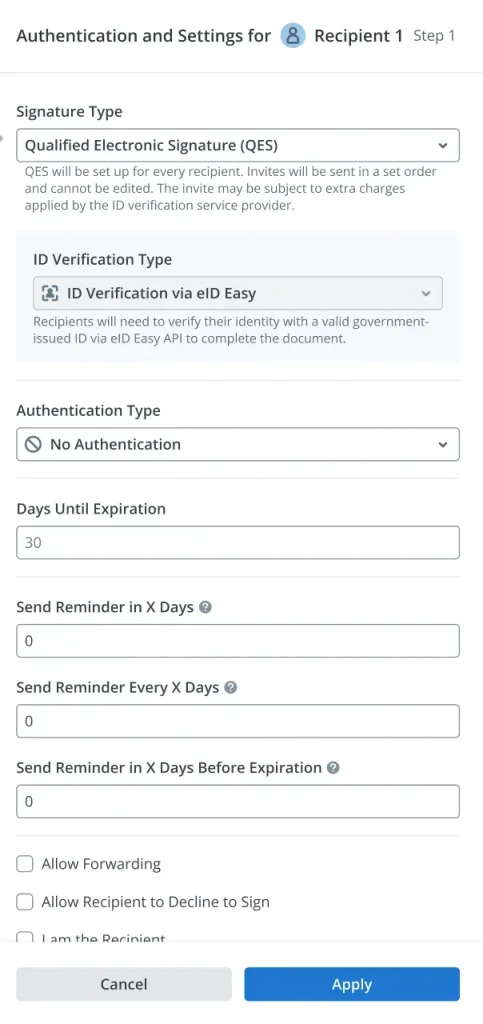
3. The signer receives an invitation to sign the document and is prompted to verify their identity before proceeding.
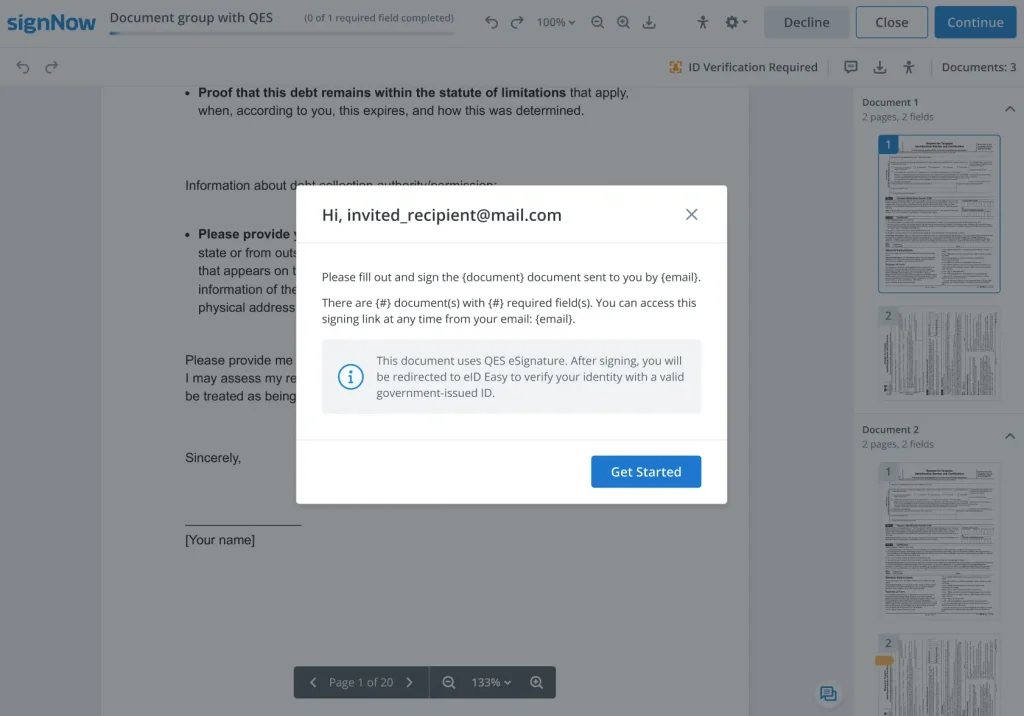
4. The signer selects one of the offered trust service providers to proceed with the identity verification.
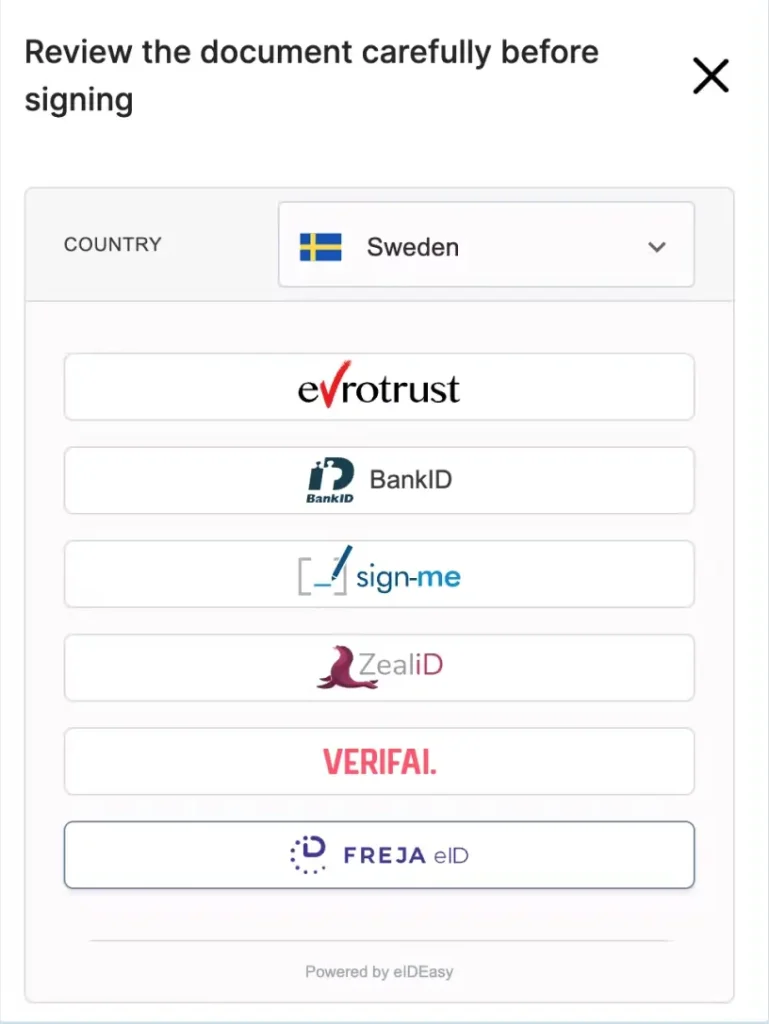
5. The signer completes the identity verification.
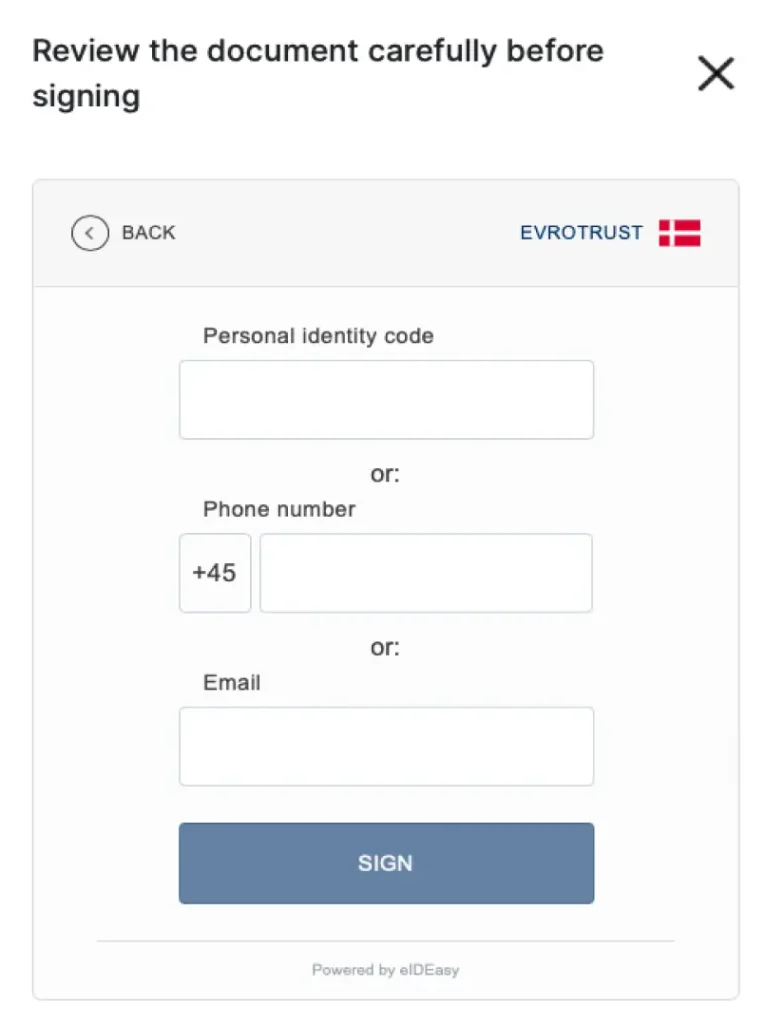
6. After passing the identity verification, the signer completes the signing process and the document is considered signed.
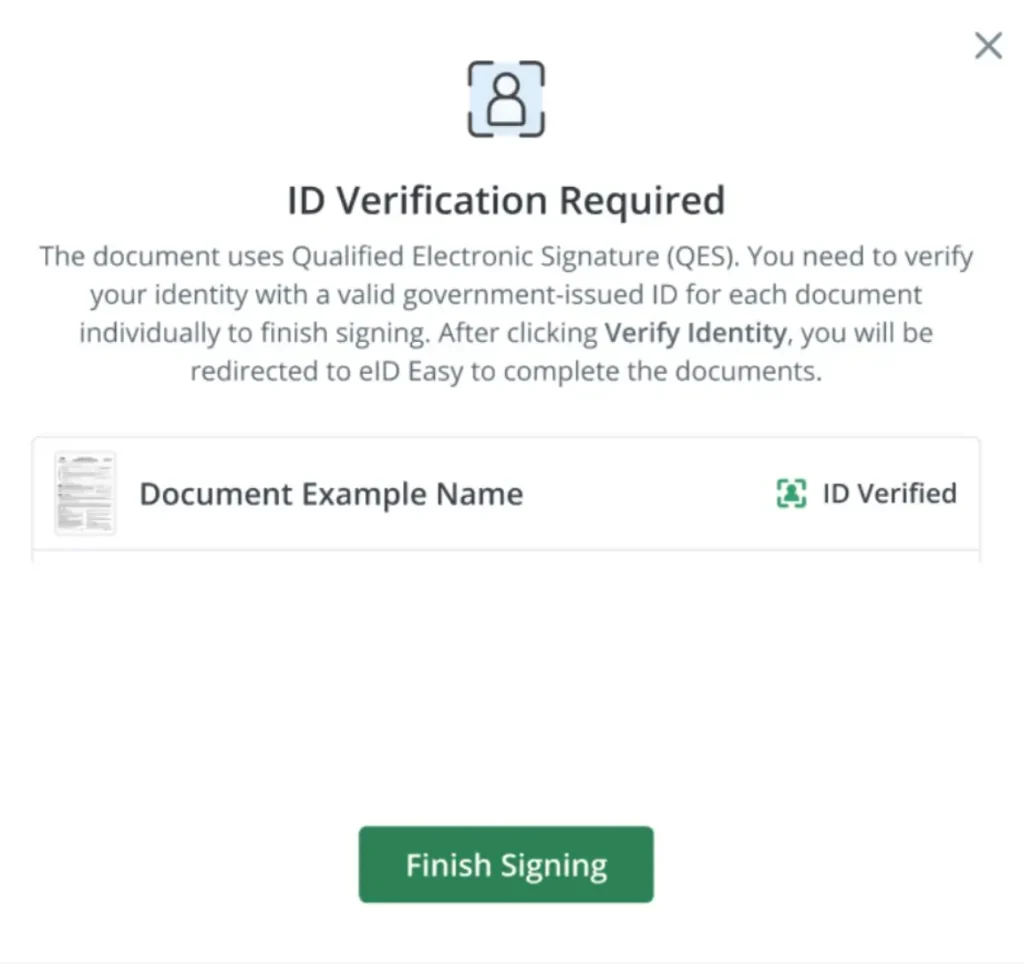
QES Identity Verification
airSlate SignNow cooperates with the trust service providers who are responsible for identifying the signatories:
- The signer needs to create a signature certificate with the chosen trust service provider and complete the identity verification.
- The list of the available trust service providers will vary depending on the signer’s jurisdiction.
- In most cases, the signature certificate is generated during the signing process, on the spot. However, in rare cases when the provider requests, the signer may be asked to separately create a signature certificate with the provider before attempting to sign the document.
- Most of SignNow’s trust service providers employ two-factor and database identity verification methods. This allows SignNow to reliably confirm the signatory’s identity and ensure a swift and user-friendly signing process for the signer.
- The certificate generated by the trust service provider confirms the signatory’s identity and the connection between the signatory and the document. It also serves as a reliable audit trail for the document.
Final thoughts
Qualified Electronic Signatures (QES) mark a pivotal point in the evolution of document signing. They offer the highest level of security and legal recognition, making them a valuable asset for businesses and individuals alike.
Using Qualified Electronic Signature within SignNow allows you to verify the identity of the signer and collect court-admissible eSignatures in an efficient, paperless, and secure manner. QES within SignNow allows you to sign documents securely and do business globally while making sure nothing falls through the cracks.

